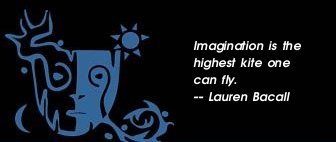|

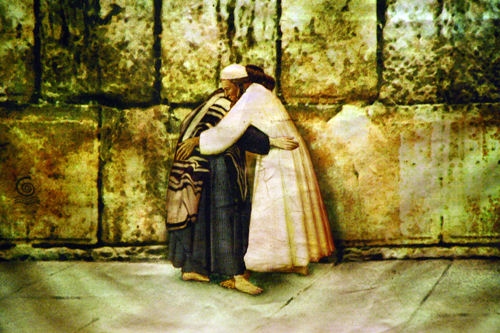
The Never Ending Journey: Mythologizing and Modernity
Words & Photos by Derek Beres
Editor's Note: Derek Beres offers the following article inspired by Mythic Journeys 06 to us
for inclusion in Mythic Passages. The article may also be read at his website
www.globalbeatfusion.com. It is
copyrighted material and may not be reproduced without permission. The photos are taken by Derek Beres, and
they include photos of images and installations created by Michael Green as Experience Designer for Mythic Journeys 06.
Michael Green's work includes The Illuminated Rumi; One Song:The New Illuminated Rumi; The
Illuminated Prayer; and more. See his website www.MichaelGreenArts.com.
Trying to wrap your head around experiences of tremendous magnitude can only be done after the fact,
for in the midst of the action you must soak in as much as possible without leaving room for explanation. If one
attempts to put the experience into perspective while it is happening, much is lost. For the five days at the
Mythic Journeys conference in Atlanta I absorbed the event, keeping reflection at a minimum. This
allowed for an extremely inspiring flow that seamlessly worked itself into my mental storage area for inspection
at a later time. The result of that time is this essay.
The second edition of this gathering, originally conceived in 2004 as a tribute to the works and life of Joseph
Campbell, was as exciting and fresh as the inaugural chapter. Mythology is generally confined to two grey areas:
stodgy academia, with its audience more concerned about sophistic debate and rigorous linguistics than actual usage,
and the more airy New Age-isms that utilize certain aspects of ancient stories in promotion of abstract reruns of the
original. Mythic Journeys, as do many of the participants, represents an attempt at honoring the myths as
well as integrating these lush folk tales into contemporary society: the journey we are on today.
During my wanderings around the Hyatt I was struck by so many amazing minds, and the bodies carrying them,
I chose the role of silence as often as possible. Soaking in such a diverse array of speakers was a lot to handle, beginning
with the opening invocation. Native American leader Tom Blue Wolf, founder of an indigenous organization dubbed
Earthkeepers One Tribe Trading Company, wrapped his speech around a concept that resonated with me for the
rest of the long weekend: "The universe will change to accommodate your perception of reality."
Blue Wolf gave numerous examples of the importance of maintaining a symbiotic relationship with the physical,
muddy and translucent world which we inhabit, the integrity of maintaining familial and communal relations, and a
general sense of open-heartedness in all our endeavors. Like many of the speakers, he had an innate sense of humor,
his shadowed by an overall calm. When the meaning hit, you were already wrapped inside his message. He reminded
the audience that if you tell the story enough, that's the story you become; a homeopathic mythology for
sure, where the healing of perception begins in the discipline of remaining open to various ideas.
Global culture is at such a junction. Throughout his book Myths to Live By Campbell reiterates the necessity
of updating our mythologies to the present, stating that 2,000 year-old trains of thought, while philosophically rustic, are
more likely rusted. We are responsible, as individuals and a civilization, to draw from the depths of wisdom our elders have
passed down, while simultaneously keeping updated with the landscape engulfing us. To apply the religions of people
centuries behind the printing press to the world of technological misfits we've become is totally absurd, yet that's
the situation we often find ourselves in.
Words like "universal," "global" and "community" remain on the tip of many tongues. These are powerful concepts
if clear of, again, the New Age connotations that basically sum up to "everyone like us." The danger of the idea of world
peace is that it is accomplished through the structure of a small number of people. It is easy, in a loving, caring environment,
to begin to think you've found the key to some secret, esoteric concept. With that thought comes conceit, and eventually
deceit. One of the most powerful messages of mythology is the ability to see through the this/that mentality of a privileged
group. Taoism eloquently sums this with their concept of yin and yang, and the ways in which both entwine and dance.
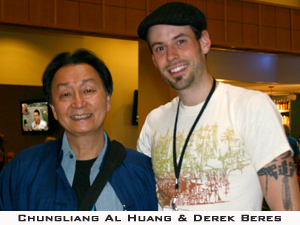 One of my personal highlights served this very point, sitting on a panel discussion called "The Body as Landscape" with
William Doty, Allen Pittman and Chungliang Al Huang. The latter co-wrote Tao: The Watercourse Way with Alan
Watts, one of my earliest studies in this field, so sitting among such a distinguished group was both honoring and humbling.
Like much of my work with this conference, I felt I had the opportunity to offer a youthful perspective — most participants
have been working in their fields longer than my 31 years of age. As a yoga and Budokon instructor, teaching highly aerobic
and physically demanding forms of movement, being with these men reminded me of a long-time idea: all movement evolves
into Tai Chi, or meditation.
One of my personal highlights served this very point, sitting on a panel discussion called "The Body as Landscape" with
William Doty, Allen Pittman and Chungliang Al Huang. The latter co-wrote Tao: The Watercourse Way with Alan
Watts, one of my earliest studies in this field, so sitting among such a distinguished group was both honoring and humbling.
Like much of my work with this conference, I felt I had the opportunity to offer a youthful perspective — most participants
have been working in their fields longer than my 31 years of age. As a yoga and Budokon instructor, teaching highly aerobic
and physically demanding forms of movement, being with these men reminded me of a long-time idea: all movement evolves
into Tai Chi, or meditation.
Al Huang is a Tai Chi expert, and the day following our panel he presented a lecture on the I Ching. The concept sticking
with me involves the end of the philosophical circle this Taoist system proposes. Hexagram 63 means completion; 64, the last in
the diagram, actually means before completion. This implies the circle never really closes, much in the same way yin and
yang dance in a fire of black and white. Western time is painted with a very linear brush: past leads to present, followed by future.
The entire perspective of the East is cyclical, tying in to the idea of an eternal presence underlying all material form. The notion
"this" leads to "that" leading to "that" is beautifully summed by the Hindu neti neti: not this, not that. When time
(or our perception of it) becomes circular rather than straight, we have a much more realistic picture of the universe: one that
bends, as space curves, as the astrological template above us nightly dances. Again, this linear concept is in desperate need of
a remix; the idea may have held up in a world where this planet was flat, but imagine that thinking today!
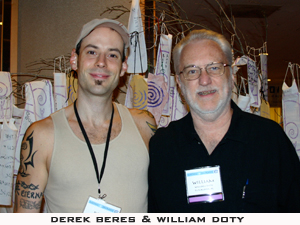 Yet we do not have to imagine. We are consumed by this ancient way of thinking that, in reality, never served us well.
Having a reliable timetable, with the implication that we are leading toward something important (much the way Jacob's ladder
stretches skyward), is a great layout. When taken as the entirety of time we fail to see the cycles in front of us. Nataraja, Siva
in dancer's form, is the Indian response to such trains of thought — he dances, the world is destroyed, and rebuilds itself
again. We are of one great process continually processing ourselves. When we change our perception, the universe changes
with us.
Yet we do not have to imagine. We are consumed by this ancient way of thinking that, in reality, never served us well.
Having a reliable timetable, with the implication that we are leading toward something important (much the way Jacob's ladder
stretches skyward), is a great layout. When taken as the entirety of time we fail to see the cycles in front of us. Nataraja, Siva
in dancer's form, is the Indian response to such trains of thought — he dances, the world is destroyed, and rebuilds itself
again. We are of one great process continually processing ourselves. When we change our perception, the universe changes
with us.
You can say this conference is built on such an assumption: the ability to peer back and distill the essence of past teachings,
understanding that these teachings are in no way static but alive and present. We only need to look at the magic of words
and their ability to mean numerous things at once to realize that the poetry of elders weaves in and out of modern culture. This
idea was presented in no clearer form than by Michael Meade.
One of the few men that have successfully integrated initiatory studies into a broad consciousness, Meade has written
such books as Men and the Water of Life in his attempt at preserving and presenting ritual to public audiences. His
workshops teach participants of all ages the importance of rites of passage, and how without them we create our own. The
danger, he insisted, was that in the creation of personal and small group rites, results are often misconstrued without any
sense of the sacredness. I resonated with Meade's teachings deeply in 2004 when I was working on my book
Global Beat Fusion, which treated international electronic music as the means in creating a new world mythology.
The traditions of fire dancing and such are not so widespread, so the unconscious reaction by youthful generations has been
occurring in the dance club. And as a little white pill going by the name of Ecstasy has replaced the Shamanic journey of the
same name, without proper guidance and comprehension this escapade could very well be destructive.
During one of his talks Meade noted, "Someone once said religion is what happens when a group of people fervently believe
in someone else's spiritual experience." Of course the importance of this is on the "someone else," not personal experience.
Hence world religions exist centered around one man and, often, only particular aspects of that man (i.e. the "perfected"
body). In his book An End to Suffering journalist Pankaj Mishra does an amazing job at humanizing the Buddha,
one such figure that is often mythologized as faultless. He discusses his severity and need for dominance, often forcing his
will upon others. Portuguese novelist Jose Saramago does a brilliant job at doing the same for the Christian savior in
The Gospel According to Jesus Christ. Both of these authors point out that the ability of these prophets was
not in their perfected qualities; it is in their all-too-human personalities, albeit rather keen and gifted ones.
Meade's initiatory rites serve such a function, that is, bringing the mythology into our daily lives. "When a culture doesn't
introduce rites of passage, the youth invent them in a misguided manner," he stated during one workshop, pointing out the
unconscious drive toward ritual. In the dance club scene, for instance, the initiate enters during a late hour and becomes
involved in a ceremonial dance with hundreds, or thousands, of others swaying under one rhythm. The DJ plays the Shaman,
guiding the energies and emotions of dancers with his or her musical selection. For the experience to be successful, both DJ and
dancers, at some point (and often for extended periods of time) share one mind — the movement of those on the
floor precisely mimics the selection by the turntablist. I can only say from experience that many times I had one song cued
up and, upon looking out and feeling the vibe, realized another song was appropriate. I did not sit back and philosophically
reflect the decision — something I'm doing now by writing about these experiences — but instinctually actualized
the moment. The dance, the lila of Hindu theory, is not particularly questionable; when you are lost in the rhythm
you don't stop to think about the ways in which your body moves. You simply move.
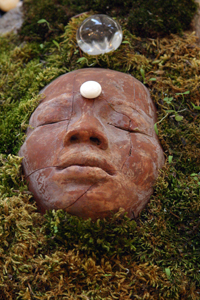 Let us not paint too blissful a picture here. While the dance is one celebratory aspect of the ritual, strife and confusion
dominate. As Meade noted, "Initiation requires trouble. A person has to come through suffering to learn who they are. It is
the process of self-realization. Initiation always has a brush with death. All philosophy begins with death. Until we understand
that, we cannot talk about life." This sentiment was not his alone, for many speakers addressed death as a way to understanding
life. In fact, many believe death to be the very initiation that leads to life, hence the circulatory nature of time professed by
Eastern thinkers. As one of the many brilliant sayings of Seneca goes, "Unlike life, death cannot be taken away from man, and
therefore we may consider it as the gift of God."
Let us not paint too blissful a picture here. While the dance is one celebratory aspect of the ritual, strife and confusion
dominate. As Meade noted, "Initiation requires trouble. A person has to come through suffering to learn who they are. It is
the process of self-realization. Initiation always has a brush with death. All philosophy begins with death. Until we understand
that, we cannot talk about life." This sentiment was not his alone, for many speakers addressed death as a way to understanding
life. In fact, many believe death to be the very initiation that leads to life, hence the circulatory nature of time professed by
Eastern thinkers. As one of the many brilliant sayings of Seneca goes, "Unlike life, death cannot be taken away from man, and
therefore we may consider it as the gift of God."
The problem, Meade concurred — and I believe many speakers that weekend would agree — is in the modern
world's notion that we enter this life a blank slate, with no prior consciousness. The Indian idea of reincarnation, one thousands
of years old, stands in direct contrast to this: the Spirit, Brahman, takes off and puts on bodies as we change clothes (goes one
sentiment in the Bhagavad Gita). The idea of circular time is dependent on the fact that we leave one life to partake
in another, carrying with us past deeds and subtleties playing into now. This concept is not only a metaphysical summation of
one lifetime, but actually and really believed to be the case over numerous generations. In a world governed by the thought
that you have around 80 years to accomplish your destiny and take off, this just doesn't hold.
And yet, in a strange way, Mythic Journeys is itself a refuting of this "law." The organizers often admit that it "just
felt like the right thing to do," a rather unconscious duty driving them to create one of the most powerful expressions of
mythology on this current planet. Campbell expressed the seemingly spontaneous occurrences of myth and ritual appearing
worldwide in places where cultures would have had no contact with others. Now that Earth is connected through wires (an
effective use of alchemy if ever) and, more interestingly, wireless means (an even more effective use of psychic energy via
radio waves), we have new mythologies to explore and create. Mythic Journeys is one such event.
I need to close with two great ideas expressed by Tom Blue Wolf, ever the humorous humanist. With his son, Little Blue,
walking through the crowd, crawling inside drums and making shadow puppets on the screen behind his father, Tom proved
one of the most candid personalities throughout the weekend. At one point, discussing the Great Spirit and It's ability to speak
to us, he said "When the Lord says sit down, you don't look for a chair." The next sentence: you sit right where you are.
This reminded me of an old Asian tale of a student learning the lessons of his guru. Recently he had been instructed that
the Divine is everywhere and permeates all things, and that he was as much a part of It as anyone else. Meditating on this idea
he sat in contemplation in the middle of the road when he was startled from his concentration by an approaching elephant. The
beast was charging faster and faster, and the student, confident in his teacher's lesson, thought that since he was the Divine
he could simply will the elephant to stop. When the creature was but steps away he whipped his trunk upon the boy, picking
him up and throwing him to the side of the road while continuing to run. The boy, stunned more than injured, went to his guru
to express his disbelief.
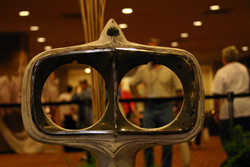 "Teacher, you said we are all part of the Divine, yet when I tried to put this into practice I was nearly run over by a charging
elephant," relayed the student. The teacher, with that ever sly akimbo and smile so familiar to masters, simply replied, "Yes! That
was God telling you to get out of the way! Why did you not listen?"
"Teacher, you said we are all part of the Divine, yet when I tried to put this into practice I was nearly run over by a charging
elephant," relayed the student. The teacher, with that ever sly akimbo and smile so familiar to masters, simply replied, "Yes! That
was God telling you to get out of the way! Why did you not listen?"
Campbell expresses a similar sentiment in his philosophy of the little g and big G, G meaning Godhead. We are all little Gs,
it goes, part of one continuous and eternal process casting aside bodies while living richly through each. The problem arises only
when we, the individual, religious group, nation or particular philosophical/spiritual tradition, believe us to be the big G.
When hubris runs rampant, nations are squashed.
I think Campbell would have agreed with another of Blue Wolf's monumental sentiments, one powerful enough to close
this short summation of a short weekend that served as part of a long process of mythologizing. Knowing Campbell's love for
the troubadours and the spirituality accomplished through various forms and definitions of love, Blue Wolf nailed it when discussing
the unconditional variety. "Even though you think it's coming out of you," he said, "it's really coming into you." This requires that
little leap of faith James Hillman reminds us about in Re-Visioning Psychology, one book that posits the Soul using humans
to express Itself — or in David Abram's brilliant The Spell of the Sensuous, where he takes an ecological stance
of the world informing us of our own nature. That is because we are not separate from the planet which we inhabit. Its nuances
and patterns are our own, and vice-versa. And if this seems a stretch to the imagination, just remember that the universe will
change to accommodate such a perception. Because really, to close with another Campbellian idea, if all this was for naught, if
all the mythology really meant nothing in the end and this entire life was pointless, void of meaning, wouldn't it be better to live
as if it did?
Derek Beres'
Global Beat Fusion website
Return to the Mythic Passages Menu
Subscribe to the Mythic Passages e-zine
|
